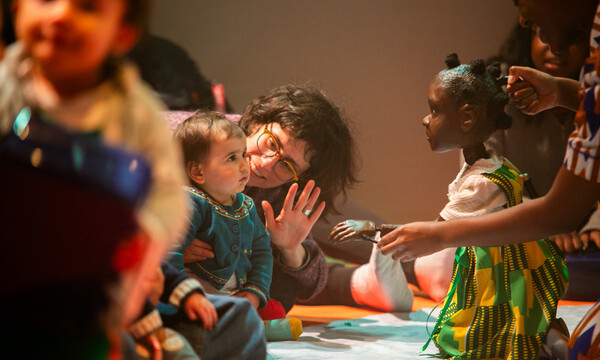News Story
Written by Sam Marlowe
As a theatre-fixated, story-adoring child, I loved to play at Greek mythology. I would fashion myself what I imagined was a classically-draped chiton from bed sheets (sorry, Mum), and trail majestically about the house weaving tales of vengeful gods, glittering palaces, perilous voyages and fantastical creatures. Now that I’m fortunate enough to make my living writing about plays, I get to watch a different story almost every night, and my fascination with the Greeks is as intense as ever. But you don’t need to be a theatre fan, much less a scholar in Homer, Aeschylus, Euripides or Sophocles, to know the power of these ancient narratives. Their influence is immense. They're in the way we talk, and in the films, books, TV shows and dramas that we devour. And as clearly as Narcissus gazing into a limpid pool, we see ourselves reflected in them: our passions, fears, ambitions and jealousies, the discord that leads to war and its devastated aftermath, the strengths, frailties and failings of those who govern us.
Take that self-obsessed young hottie Narcissus. He gave us the word narcissist; his 21st-century counterparts have a phone rather than a pool to gaze into, and they’re hooked on social media and selfies. And there are countless other everyday cultural and linguistic echoes. We worry, for example, that opening Pandora’s box will lead to disaster, or that our enemy may locate our Achilles heel. If we’re training for the Olympics, we might be wearing Nikes (the sports brand is cannily named after the Greek goddess of victory). Maybe we even bought them at an Oracle shopping centre.
There’s an indelible vividness about the Greek myths. Who could forget Midas, whose power to change everything he touched into gold turns from greed-fuelled fantasy into torment? Arachne, the pretty girl with a talent for weaving, transformed into a spider by the envious goddess Athena, from whom we get the term arachnid? Or Theseus facing down the Minotaur in its labyrinth? They immediately conjure such colourful imagery that it’s no wonder they’re a source of inspiration for comic-book adventures. Greek gods and demigods are the ancestors of the superheroes of the Marvel and DC universes. Metamorphosis, hazardous moral quests, fabulous beasts and magic are the stuff of fantasy and science fiction, from Spider-Man and Wonder Woman to The Lord of the Rings and Harry Potter.
But we mere mortals can find ourselves in these narratives, too. Most of our personal family dramas aren’t, thankfully, as dark and twisted as those of Sophocles’ Oedipus, or the blood-drenched House of Atreus, whose travails drip like poison through Aeschylus’ epic trilogy The Oresteia. But in our modern lives, we all at some point experience blind, burning rage, the pang of betrayal, the ecstasy of love, the gnawing grief of loss and regret. Greek tragedy teaches us timeless lessons about the futility and destructive legacy of violent revenge. It lays bare a world in which there is a clear moral dimension, and yet fate can be unbearably, and unjustly, cruel: terrible things happen to blameless people. Similarly, those with the greatest power are often unqualified to hold it; sometimes they misuse it, with appalling consequences. These are the fundamentals of human existence: philosophical ideas we are still grappling with over 2,000 years later.
And it is that, above all, that makes the Greeks so indispensable. They appeal both to our intellect, and to a profound part of our nature, where we respond to shock and wonder. And they offset order and chaos, agony and ecstasy, the primal and the rational, embracing and exploring our complexity both as animals of appetite and instinct, and as civilised people. We retell them because they are stories about every one of us. We will always need them.



